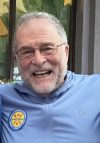- David Ellingson (left), Deby Cassill and David Gehrke at Angkor Wat, at the end of their adventure up the Mekong River.
- David Ellingson, the “Paddle Pilgrim,” led a group along the Mekong River through Laos, Cambodia, and Vietnam to the South China Sea.
- The group paddled in Southern Laos toward the Khone Falls, the largest waterfall by width (9 miles) in the world.
Imagine the Mekong River as it winds through Laos, Cambodia and Vietnam to the South China Sea. A unique riverscape with houses on stilts, fishermen tossing nets, gilded temples and rhythmic music with each paddle stroke. I hear Tina Turner wailing, “Rollin’ on the river ….” Every dream begins with a romantic vision that ultimately must face reality.
A more appropriate tune would be “roasting on the river,” as we were met with 95-plus-degree days, portable but slow inflatable kayaks, smoke-filled skies from rice farmers burning their paddies, and, yes, our aging bodies.
As the 75-year-old “Paddle Pilgrim,” I had paddled the Fjords of Norway and the Mississippi River, Erie Canal and Hudson River to the Statue of Liberty, and I was confident that the team I had recruited was capable. Deby Cassill, 75, is a world-renowned field biologist; David Gehrke, 74, is a retired criminal defense attorney and frequent pilgrim on the Camino del Santiago; and Lutheran pastor Tom Glasoe, a youngster at 48, is a Vietnamese American returning to his home country.
Whether one is paddling a river or navigating a life journey, midcourse corrections are crucial, and the Mekong Paddle Adventure was no exception. As we shared our stories and pictures with friends back home, a change in perspective began taking place. One friend noticed we weren’t paddling as much as expected and commented, “Looks like you are stopping to smell the roses.”
We were filled with gratitude for the river, the people and the cultures we had experienced on our Mekong River adventure.
Rivers can become teachers, and the Mekong was telling us to slow down. In addition to the twists and turns and rapids, the Mother of Waters was pointing us to the people on her shores, to their unique cultures, their challenges and their welcoming hospitality. Because the lotus is the symbol of Southeast Asian culture and is frequently seen along our journey, we decided to “linger with the lotus.”
As we paddled in Southern Laos toward the Khone Falls, the largest waterfall by width (9 miles) in the world, we snaked our way through the land of 4,000 islands. Our paddle was both beautiful and treacherous, and we were delighted late one afternoon to see a large structure on the river’s edge. It was the Pon Arena Hotel. After our time camping on sandbars, a shower sounded wonderful. The hotel was beyond our imagination, with a swimming pool, dining room and river-view rooms at $30 a night, including breakfast.
Visits with “river angels”
Pon, the hotel owner, was our first “river angel.” Business was slow because the economy was still recovering from COVID, but he took us under his wing and became our host and friend. One highlight was his guiding us to the falls, where we captured spectacular drone images of the cascading cataracts bathed in mist. On the way he made a special stop to show us a construction site being developed by China as a tourist “city” with hotels, restaurants and golf course. This was our first encounter with a major challenge facing this region: significant investments by China in dams, infrastructure and tourism. This was our initial taste of “neocolonialism.”
Our next “river angel” was Phillip Baker, an expatriate American and Lutheran pastor, who has lived in Cambodia for many years doing a different kind of development work. Here’s his description: “In 1979, the Lutheran World Federation established a [nongovernmental organization] in Phnom Penh, at the time called Lutheran World Federation–Cambodia, now called Life With Dignity. Almost 50 years later, you are still here. You are here through the continuing presence of the Life With Dignity project with foci on sustainable livelihood, clean water, sanitation and latrines, and teaching of hygiene.”
Life With Dignity is supported by the ELCA and helps the country heal and recover from the trauma of the Khmer Rouge genocide that killed 2 million people and is portrayed in the film The Killing Fields. Each evening Baker helped us process our experience and see hope amid struggles.
Our final angels were a “host” led by Nguyen Minh Quang, a professor at Can Tho University in Vietnam. Through the Mekong Environmental Forum, Quang researches the effects of climate change in the Mekong Delta and develops strategies for creating sustainable agriculture, fisheries, enhancing the role of women, rural health and ecotourism. We were back on the water again as we toured pilot programs with floriculture projects raising crabs, shrimp, fish and bees, and cottage industries with local crafts that included weaving silk.
Our journey ended with a visit in Cambodia to Angkor Wat, a magnificent temple at the center of the Khmer Empire, which ruled this region from the ninth to the 15th centuries. Lingering with the lotus, we were filled with gratitude for the river, the people and the cultures we had experienced on our Mekong River adventure.








